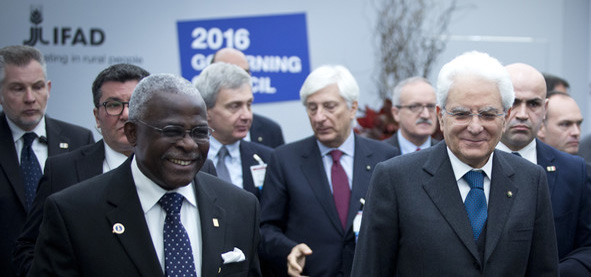ROME (INPS | IDN) – The United Nations International Fund for Agricultural Development (IFAD) has joined hands with the International Center for Agricultural Research in the Dry Areas (ICARDA) linking research to development impacts in the Near East, North Africa and Europe.
A joint seminar held during IFAD’s 39th Governing Council meeting that concluded in Rome on February 18, showcased results from IFAD investments in agricultural research for development through Beirut-based ICARDA which proved effective in raising the incomes of smallholder farmers and helping them adapt to new climate-related challenges.
The need for investing in smallholder agriculture in developing countries was underscored by Italy’s President Sergio Mattarella in his opening statement to the Governing Council. Such an investment was a cross-cutting issue that helps to stabilize communities and countries and reduce migration and conflict, he said.
“The IFAD and ICARDA partnership is well established,” said Perin Saint Ange, Associate Vice-President of IFAD. “Together we are constantly looking for ways in which we can help smallholders adapt to new challenges and opportunities in the region and beyond.”
“The route to achieving rural transformation requires making financial resources available for the key partners in the agricultural sector, producers on one side, and knowledge and research partners on the other,” commented Ibrahim Adam Ahmed Al-Dekairi, Sudan’s Minister for Agriculture and Forestry. Beyond research and finance. It was also noted that for the development to be sustainable, creating the right enabling policy environment is crucial.
During the seminar, scientists presented innovative approaches in Egypt, Central Asia and Jordan to increasing water and land productivity, climate change adaptation as well as linking poor women livestock producers to global yarn markets.
In Egypt water scarcity is increasing at an alarming rate and now falls below the international water poverty line of 1,000 cubic metres per capita per year. Considering population predictions for 2050, Egypt will be down to absolute scarcity level – lack of access to adequate quantities of water for human and environmental uses – adding to the problems with water allocation for agriculture, IFAD said in a media release.
The challenge for Egypt is to find ways of producing more food with less water and during the seminar participants heard about some options. In the IFAD-financed Upper Egypt Rural Development Project, for example, farmers are successfully adopting raised-bed systems for improved wheat production and productivity, achieving higher yields while saving water for irrigation. What is required to increase the adoption rate is apparently the availability and affordability of the technologies.
Jordan is the third driest country in the world. The availability of fresh water per capita is almost 90 per cent below the international water poverty line. In addition, nearly 1 million Syrians now live in Jordan, placing more pressure on already scarce water resources and facilities and affecting food security.
Another example discussed at the seminar came from Jordan’s Badia, a region that covers some 90 per cent of the country and is an important source of grazing for livestock which makes water management vitally important.
The IFAD-supported Agricultural Resource Management Project (ARMP-II), adopted water harvesting techniques that included micro-harvesting of rainwater as well as using a Vallerani plough to stabilize soil in the Karak and Tafila Governorates.
In fact, the project has already purchased three Vallerani ploughs to assist the Ministry of Agriculture in expanding the technique further in order to increase vegetative cover and improve soil productivity, said IFAD.
In remote regions of Central Asian countries, like Tajikistan and Kyrgyzstan, many households depend on goats and sheep for their livelihoods. However, poor livestock productivity and access to markets, as well as the lack of know-how, limit their income-earning opportunities. As a result, they struggle to escape from poverty.
The project showcased during the seminar demonstrated the success of linking poor women livestock producers to the global yarn market. This example was just one of several others discussed that demonstrated the importance of value chain development as a way to empower rural women, and alleviate poverty and reduce food insecurity.
“While it is true what the Director General of ICARDA said, we cannot have development without research, it is also true that there is no peace without development, and therefore, no peace without research,” said Khalida Bouzar, Director of the Near East, North Africa and Europe Division at IFAD.
IFAD is an international financial institution and a specialized United Nations agency based in Rome – the UN’s food and agriculture hub. It invests in rural people, empowering them to reduce poverty, increase food security, improve nutrition and strengthen resilience. Since 1978, the organization has provided US$17.6 billion in grants and low-interest loans to projects that have reached about 459 million people. [IDN-InDepthNews – 25 February 2016]
IDN is flagship of the International Press Syndicate.
Photo (front): IFAD President Kanayo F. Nwanze with Italy’s President Sergio Mattarella.

